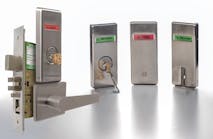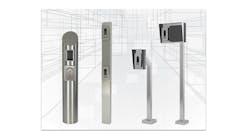The tradition of training the next generations of locksmiths and security technicians in our industry goes back decades. Pre and post-WWII electronics magazines and men’s journals showcased advertisements for mail order locksmith schools and courses. Soon brick and mortar schools appeared offering perspective locksmiths hands-on training and potential start-up kits.
Two of the most influential and oldest locksmith schools in the country today are steeped in tradition and continue to serve the community. Lockmasters Security Institute (LSI) and the North Bennet Street School (NBSS) remain the only two non-vendor affiliated institutions operating that provide on-premises education.
In the early 1950s and into the 1970s, the popularity of locksmith schools exploded in part to the efforts of industry pioneers like Harry Miller, Jim Taylor and Leonard Singer who saw Lockmasters Inc. evolve from the grassroots educational programs offered by Sargent & Greenleaf. Eventually, Miller, Taylor and instructor Rex Parmelee expanded the educational program, and when Harry Miller retired, son Clay bought the business and relocated it to Nicholasville, Ky., where it resides today under the leadership of Harry’s grandson Mark Miller.
When it comes to the mission and scope of both facilities, they have stayed true to the original objectives established years ago, which is to train security professionals and provide a quality educational environment.
“Lockmasters designs and makes quality education programs, lock parts and tools designed to meet or exceed the operation of those concerned with or operating within the security community. At LSI, our tagline is Building Lives and Securing Futures. We want to be the impetus for our students in this field and the one that they can come back to when they have questions. Our instructors are highly qualified, top-tier subject matter experts, with substantial field and classroom experience. LSI’s worldwide reputation is a result of our instructors’ experience, their scope of knowledge, and their ability to train students with relevant, real-world scenarios,” says Ricki Keaton, Marketing Manager for Lockmasters, Inc. “Whereas, the mission and scope have not changed, the curriculum has. We evolve as needed in an ever changing industry. As new products are introduced and new tools introduced we must keep up with this in our classroom so the new locksmith will have this knowledge when they leave LSI. We’ve also incorporated e-books on Kindle to allow for interactive videos and presentations in our manuals, as well as updating electronically.”
Kevin Derrick, director of marketing and communications for the North Bennet Street School located in Boston, Massachusetts, says NBSS’s mission is to train students for careers in traditional trades that use hand skills in concert with evolving technology, to preserve and advance craft traditions, and to promote greater appreciation of craftsmanship.
“In addition to the hands-on, nine-month Locksmithing & Security Technology (LK) curriculum, we regularly schedule class presentations by industry representatives. This helps ensure we are always teaching the latest in technologies to our students,” he adds, pointing out that their unique Locksmithing & Security Technology (LK) program allows students to jump-start a locksmithing career and quickly earn a return on their educational investment. Unlike online courses, in the hands-on, full-time, nine-month program students learn from a master locksmith in small classes. Most students work in the field while enrolled.
So what are some of the best practices and characteristics that any security practitioner should be looking for when choosing a non-vendor sponsored training event or education facility? According to Keaton at LSI, you want to make sure you choose a provider who has the latest in technology and equipment.
LSI has a new 27,000-square-foot training facility, equipped with up to date technology in the classrooms. Classrooms are large and thoroughly equipped with the latest tools and technology from smart boards to document cameras. Students can spend their time out of the classroom in the break room playing ping pong, shooting pool, playing a game of chess, throwing darts or relaxing in our new quiet room. LSI also houses the Harry C. Miller Lock Collection, one of the world’s most extensive lock collections with locks dating back to 1303.
“In addition to the state of the art facility, the ‘LSI Experience’ is what keeps our students coming back as well,” Keaton says. “The LSI experience is the total package. From the legacy that Harry Miller built many years ago to the integrity and expert hands-on instruction that we bring to the classrooms to the southern hospitality, customer service, networking and technical support, it is an experience and we pride ourselves in making this a reality for each new student.
“In our classrooms we are teaching a trade; we are not training on a specific lock or tool. We want to ensure that the student is well rounded in the trade before we send him/her off. If they are struggling, we spend more time with them; if they are excelling, we encourage them to take the next step.”
NBSS’s Derrick maintains that it is mechanical aptitude, learned concepts and procedures, and hand skills that are still absolutely necessary for today’s locksmith. He adds that basic electronic theory and concepts are important to learn, pointing out that at NBSS they instruct in a way that adheres to industry standards and manufacturers specifications.
“This past semester we developed a skills aptitude test to be administered to each prospective LK applicant. This is a great experience for us to gauge a candidate’s mechanical aptitude, methods and problem solving skills. This also helps the applicant get a glimpse into what working on equipment with tools will be like,” says Derrick.
“The most important aspect of any program is the quality of instruction. Barb Baker, LK Department Head & Instructor, is an NBSS alumna, an experienced locksmith, as well as an electronics trade school graduate. She is a Member of the Associated Locksmiths of America, and is a Board Member of the Massachusetts Locksmiths Association. She has worked in both industries since 1979. In addition, NBSS is accredited by the Accrediting Commission of Career Schools and Colleges (accsc.org) and licensed by the Department of Professional Licensure.”
Make no mistake about it, while the core of the locksmith trade may be mechanical, schools like LSI and NBSS stay current with emerging technology trends and applications that may affect the locksmiths. But there is a difference between the two.
While LSI does still offer the staples of locksmith trade, these are more of the elective courses their students choose to attend. The core courses for LSI courses are Professional Locksmithing and GSA Authorized Safe & Vault Technician & Inspector Certification. These are the courses that make up most of their student base. LSI is one of only two schools in the world to teach the GSA course (taught at both their school in KY, as well as, at its school in VA). Once the students have attended the core courses, they then start filling in with the elective courses to build their skills in the trade. LSI’s Access Control Technician course is among its most sought after courses offered, but not at the level of its core courses.
“Our student base consists of 80 percent DoD, with the remainder from government contractors and business and industry. With that said, we work with our students to build programs that work for them. For example, our courses are approved for the enrollment of veterans, reservists, service persons, and other eligible persons under the provisions of Chapters 30, 32, 33 and 35 GI Bill,” explains Keaton. “Many Veterans attend most, if not all, of our courses utilizing their benefits through the VA. We also work with Navy personnel when they are looking to obtain their NEC for Locksmithing in the Navy. We recommend which courses to attend and provide paperwork for them to take back to their command to help them obtain the new classification.”
LSI also offers more advanced security courses in their Comprehensive Security Specialist Training (CSST) is a 10 day course ideal for security managers, physical security specialist, law enforcement or loss prevention specialists.
“During the 10 days we will talk about perimeter security, intrusion detection, security lighting, CCTV, locks and locking devices, fencing, access control, legal aspects of security, contingency planning and security design. Following the lecture portion of the class we will go to a facility and conduct a security survey and develop a report based on each aspect of the survey. We will look at internal and external threats, vulnerabilities and make recommendations based on the findings from the survey. The students will present their findings on the last day of class,” adds Keaton.
As for instruction at NBSS, Derricks says their core locksmithing courses are mechanical, with aspects of electronic technology used to enhance their student’s learning experience.
“Our students graduate after an intensive 900-hour, hands-on learning journey. Even though the learning curve can be steep for any new hire, they enter the workforce with an immediate ability to be productive,” Keaton says. “The School’s LK program is overseen by an advisory committee made up of industry professionals including business owners, Institutional, residential and commercial locksmiths and product distribution company owners. We continually update the teaching/learning hardware, and our locksmithing community colleagues are more than generous with providing both mechanical and electronic hardware for our students to learn and explore.”
Each program feels they possess a unique differentiator compared to vendor-affiliated training and to their competitors.
For NBSS, Derrick says it is the comprehensive 36-week, 900 hours of experts training. “We provide a hands-on, learning environment, with a 13:1 student-to-teacher ratio, and regular guest speakers who share state-of-the-industry technology/processes. Combined with a well-connected, successful alumni community, we offer students a solid foundation toward a meaningful career, and good life, built by hand.”
At LSI, Keaton boasts it is the total package of education, tradition and experience that sets them apart from other training facilities. “It’s the legacy, integrity, hands-on instruction, customer service, networking, technical support, and Southern hospitality that make this experience unique. From before a student arrives until after they leave we want them to feel like family,” Keaton adds. “We will evolve with the trade. As it moves towards the digital world, we will adjust as needed. But perhaps there will always be a need for traditional locksmith and safe technician training, and maybe, just maybe, we will stick with what we do best.”
For more information on each school go to:
- http://www.lsieducation.com/
- https://www.nbss.edu/full-time-programs/locksmithing-security-technology
Steve Lasky is Editorial Director for the Southcomm Security Media Group, which includes SecurityInfoWatch.com, Security Dealer & Integrator (SD&I) , Security Technology Executive and Locksmith Ledger International magazines. Reach him at [email protected].






